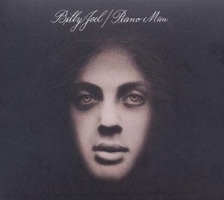Billy Joel’s 1973 album Piano Man didn’t exactly light up the charts upon its release. It was, however, a giant step forward for two reasons: it was the singer’s debut disc with Columbia and the title track was his first Top 40 single, peaking at 25. Joel believed that by signing with the big major, a little of that Bob Dylan magic would rub off. Dylan, according to the singer, was partly responsible for the label’s more nurturing approach. “This was a company,” he says, “that knows how to build a career with an artist.” Forty years have passed since the building of Billy Joel began. To celebrate, Columbia is going all out with The Complete Albums Collection, featuring 14 of the singer’s albums. And at the center of it all is a special double-disc edition of Piano Man.
The disc containing the original 10 tracks starts out pleasantly enough with “Travelin’ Prayer,” owing as much of its appeal to the banjo playing of Eric Weisberg and Fred Heilbrun — along with Elvis Presley’s drummer Ron Tutt keeping the pace — as it does to Joel. The title track that follows more or less captures the entire essence of the man, who came to Los Angeles and worked in local piano bars as Bill Martin for six months to make end’s meet and plot his next move. The song remains that quintessential career-defining first hit the singer will be playing for the rest of his life. There are, of course, other tracks on Piano Man that figure neatly into the story.
The gospel-flavored drive of “Ain’t No Crime,” The light, acoustical guitars and pedal steel slide driving “You’re My Home,” the funky Rhodes and wah-wah on “Worse Comes To Worst” – the variety wasn’t lost on the critics or the public, who helped make Piano Man a quadruple platinum album. There’s also a generous helping of songs that could only described as Billy Joel songs – the piano with all its broads strokes, plus those cheeky, insightful lyrics of tracks like “The Ballad Of Billy Kid,” Stop In Nevada” and “Somewhere Along The Line.” And then there’s “Captain Jack.”
Attaining some notoriety because of its anti-drug message, “Captain Jack” is the song that landed Joel his deal with Columbia. He’d written it in 1971, and played it live with his band. One particular performance was recorded on April 15, 1972 at Sigma Sound Studios for a live radio concert on WMMR in Philadelphia. The song took off, attracting the attention of major record labels, including Columbia. Because of its historical significance, the game-changing live version of “Captain Jack” and the rest of the Sigma Sound Studios concert, including the previously unreleased “Long, Long Time,” “Josephine,” and “Rosalinda,” fill out the second disc of the special edition of Piano Man.
So, along with a 23-page booklet that fills in all the details, you essentially get one disc that defined and one disc of rawer, unrefined, which just goes beyond the one key song to show why Billy Joel is today a revered national treasure. Altogether, a nice package that exposes the artist in early-to-full development.
~ Shawn Perry




















